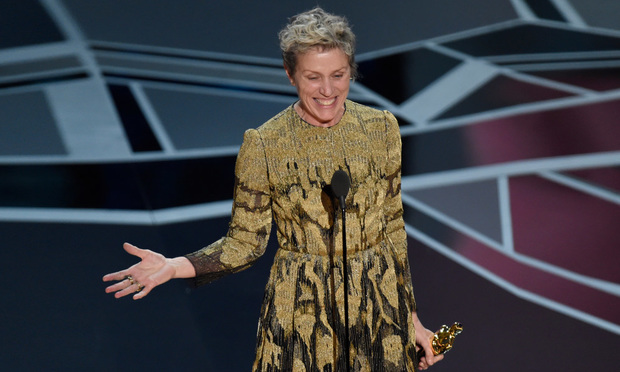The Inclusion Movement: A Look at the #InclusionRider Outside of Entertainment
Are these riders, made famous in a speech by Oscar winner Frances McDormand, viable options outside of the entertainment industry?
March 05, 2018 at 05:36 PM
3 minute read
 Frances McDormand accepts the award for best performance by an actress in a leading role for “Three Billboards Outside Ebbing, Missouri” at the Oscars on March 4, at the Dolby Theatre in Los Angeles. (Photo by Chris Pizzello/Invision/AP)
Frances McDormand accepts the award for best performance by an actress in a leading role for “Three Billboards Outside Ebbing, Missouri” at the Oscars on March 4, at the Dolby Theatre in Los Angeles. (Photo by Chris Pizzello/Invision/AP)
After Oscar winner Frances McDormand turned #InclusionRider into a buzz word overnight, the question arose whether a high-profile employee outside of the entertainment industry might seek a similar demand.
In the entertainment business, the inclusion rider is an effective means for a celebrity to ensure that more women and minorities are engaged on productions, according to Ivy Kagan Bierman, a partner at Loeb & Loeb in Los Angeles. Bierman focuses her work on employment and other business matters in the industry.
Bierman said she expects entertainment companies to negotiate an inclusion rider with language that includes a demand for “reasonable efforts” at diversity rather than specifying a specific number or percentage of diverse hires. “It will be interesting to see which companies embrace this,” she added.
Outside the entertainment industry, it's possible some highly recruited executive—a CEO or general counsel perhaps—could likewise try to insert diversity hiring goals into an employment contract.
Bierman said top executives in other industries are already “pushing for more diverse boards,” but she didn't know if any have negotiated a contractual commitment.
She thinks technology companies are especially vulnerable to diversity demands “given the gender parity problems in the tech business,” she said.
Ruth Wimer, a partner at Winston & Strawn in Washington, D.C., said certainly executives in other industries could seek such riders. “Maybe for the right kind of CEO,” she said. “You have to have the desire on the part of the executive.” Wimer focuses her work on executive compensation issues.
She said such a rider is not something one normally sees in an executive employment contract. Even if an executive does seek it, the movement “is not likely to be widespread,” she predicted.
Wimer pointed out that unlike an actor, who does not handle hiring, a CEO would already have the power to increase diversity at a company. The CEO also could have input into diversifying the board of directors, she said, without needing a rider.
On the other hand, a company could use a similar type of inclusion rider in contracts with partner companies and organizations. For example, Karen Roberts, the general counsel of Walmart Inc., recently described to Corporate Counsel how the retailer demands certain levels of diversity from the outside law firms it hires to represent the company.
Roberts also said Walmart has begun to expand those diversity demands to other suppliers of goods and services for which it contracts.
The inclusion rider was brought to the entertainment industry by the Annenberg Inclusion Initiative, with the help of Cohen Milstein Sellers & Toll partner Kalpana Kotagal, according to The Recorder, an ALM sibling publication.
This content has been archived. It is available through our partners, LexisNexis® and Bloomberg Law.
To view this content, please continue to their sites.
Not a Lexis Subscriber?
Subscribe Now
Not a Bloomberg Law Subscriber?
Subscribe Now
NOT FOR REPRINT
© 2025 ALM Global, LLC, All Rights Reserved. Request academic re-use from www.copyright.com. All other uses, submit a request to [email protected]. For more information visit Asset & Logo Licensing.
You Might Like
View All

The New Trump Worksite Enforcement Paradigm: Everything You Need to Know
14 minute read
NLRB Blisters Skilled Care Home Chain That Terminated Nursing Assistant Who Complained About Wages
6 minute readTrending Stories
- 1Jury Seated in Glynn County Trial of Ex-Prosecutor Accused of Shielding Ahmaud Arbery's Killers
- 2Ex-Archegos CFO Gets 8-Year Prison Sentence for Fraud Scheme
- 3Judges Split Over Whether Indigent Prisoners Bringing Suit Must Each Pay Filing Fee
- 4Law Firms Report Wide Growth, Successful Billing Rate Increases and Less Merger Interest
- 5CLOs Face Mounting Pressure as Risks Mushroom and Job Duties Expand
Who Got The Work
J. Brugh Lower of Gibbons has entered an appearance for industrial equipment supplier Devco Corporation in a pending trademark infringement lawsuit. The suit, accusing the defendant of selling knock-off Graco products, was filed Dec. 18 in New Jersey District Court by Rivkin Radler on behalf of Graco Inc. and Graco Minnesota. The case, assigned to U.S. District Judge Zahid N. Quraishi, is 3:24-cv-11294, Graco Inc. et al v. Devco Corporation.
Who Got The Work
Rebecca Maller-Stein and Kent A. Yalowitz of Arnold & Porter Kaye Scholer have entered their appearances for Hanaco Venture Capital and its executives, Lior Prosor and David Frankel, in a pending securities lawsuit. The action, filed on Dec. 24 in New York Southern District Court by Zell, Aron & Co. on behalf of Goldeneye Advisors, accuses the defendants of negligently and fraudulently managing the plaintiff's $1 million investment. The case, assigned to U.S. District Judge Vernon S. Broderick, is 1:24-cv-09918, Goldeneye Advisors, LLC v. Hanaco Venture Capital, Ltd. et al.
Who Got The Work
Attorneys from A&O Shearman has stepped in as defense counsel for Toronto-Dominion Bank and other defendants in a pending securities class action. The suit, filed Dec. 11 in New York Southern District Court by Bleichmar Fonti & Auld, accuses the defendants of concealing the bank's 'pervasive' deficiencies in regards to its compliance with the Bank Secrecy Act and the quality of its anti-money laundering controls. The case, assigned to U.S. District Judge Arun Subramanian, is 1:24-cv-09445, Gonzalez v. The Toronto-Dominion Bank et al.
Who Got The Work
Crown Castle International, a Pennsylvania company providing shared communications infrastructure, has turned to Luke D. Wolf of Gordon Rees Scully Mansukhani to fend off a pending breach-of-contract lawsuit. The court action, filed Nov. 25 in Michigan Eastern District Court by Hooper Hathaway PC on behalf of The Town Residences LLC, accuses Crown Castle of failing to transfer approximately $30,000 in utility payments from T-Mobile in breach of a roof-top lease and assignment agreement. The case, assigned to U.S. District Judge Susan K. Declercq, is 2:24-cv-13131, The Town Residences LLC v. T-Mobile US, Inc. et al.
Who Got The Work
Wilfred P. Coronato and Daniel M. Schwartz of McCarter & English have stepped in as defense counsel to Electrolux Home Products Inc. in a pending product liability lawsuit. The court action, filed Nov. 26 in New York Eastern District Court by Poulos Lopiccolo PC and Nagel Rice LLP on behalf of David Stern, alleges that the defendant's refrigerators’ drawers and shelving repeatedly break and fall apart within months after purchase. The case, assigned to U.S. District Judge Joan M. Azrack, is 2:24-cv-08204, Stern v. Electrolux Home Products, Inc.
Featured Firms
Law Offices of Gary Martin Hays & Associates, P.C.
(470) 294-1674
Law Offices of Mark E. Salomone
(857) 444-6468
Smith & Hassler
(713) 739-1250







